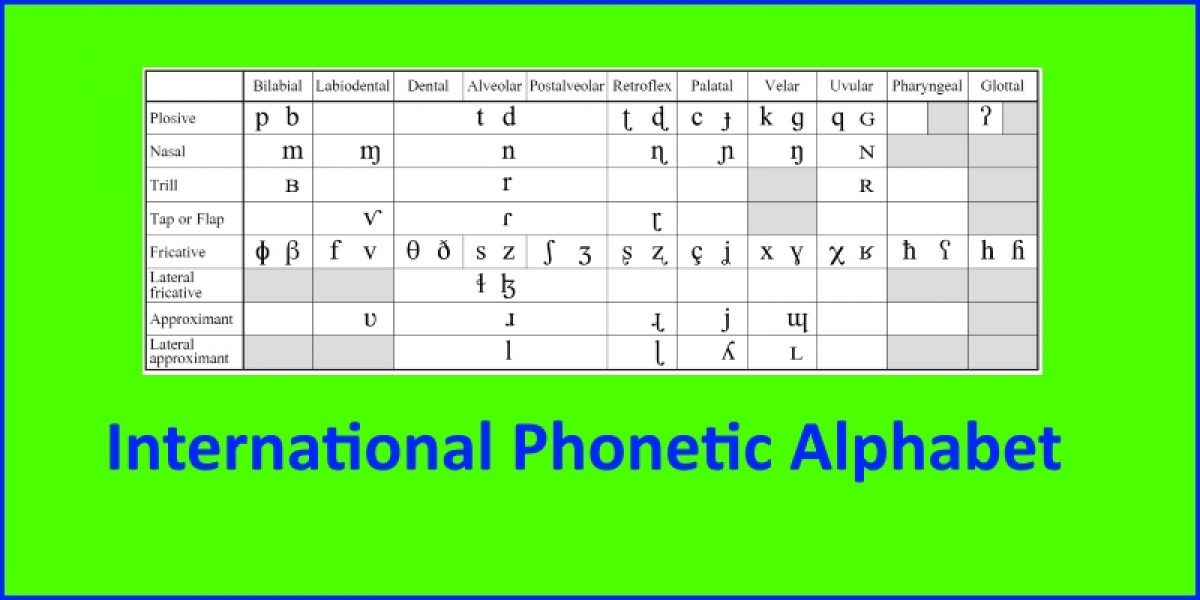The International Phonetic Alphabet (IPA) is a system of symbols used to represent the sounds of spoken language. It is used by linguists, speech-language pathologists, and others who work with spoken language.
The IPA has a set of symbols for each of the phonemes in all of the world's languages. A phoneme is the smallest unit of sound that can distinguish one word from another in a language. For example, the English words "cat" and "bat" differ by only one phoneme: the /k/ in "cat" and the /b/ in "bat".
The IPA is a phonetic alphabet, which means that it represents the sounds of speech, not the letters of the alphabet. This means that the same symbol can be used to represent the same sound in different languages. For example, the IPA symbol /a/ represents the vowel sound in the English word "hat" and the Spanish word "gato".
The IPA is a standardized system, which means that it is the same regardless of who is using it. This makes it a valuable tool for communication between linguists and other professionals who work with spoken language.
Here are some of the benefits of using the International Phonetic Alphabet (IPA):
It is a standardized system. This means that it is the same regardless of who is using it. This makes it a valuable tool for communication between linguists and other professionals who work with spoken language.
It is a comprehensive system. It has a set of symbols for each of the phonemes in all of the world's languages. This makes it a valuable tool for representing the sounds of any language.
It is a phonetic system. This means that it represents the sounds of speech, not the letters of the alphabet. This makes it a more accurate way to represent the sounds of speech than a system that uses letters.
Here are some of the challenges of using the International Phonetic Alphabet (IPA):
It can be difficult to learn. The IPA has a large number of symbols, and it can be difficult to remember all of them.
It can be difficult to use. The IPA is not a system that is used in everyday communication. This can make it difficult to use for people who are not familiar with it.
It can be inaccurate. The IPA is a phonetic system, and it is not always possible to represent the sounds of speech perfectly with symbols.
The NATO phonetic alphabet, also known as the International Radiotelephony Spelling Alphabet or the ICAO phonetic alphabet, is a set of words used to represent the letters of the alphabet when communicating by radio or other voice-only means.
The NATO phonetic alphabet was developed by NATO in 1956 to ensure that letters could be pronounced clearly and unambiguously in all languages. The alphabet consists of 26 words, each of which begins with a different letter of the alphabet.
When using the NATO phonetic alphabet, the letters of the alphabet are pronounced one at a time, with the corresponding word following. For example, to spell the word "alpha", the speaker would say "alpha, alpha".
The NATO phonetic alphabet is used by military and civilian organizations around the world. It is also used by amateur radio operators and by people who communicate by radio in other contexts.
Here are some of the benefits of using the NATO phonetic alphabet:
It is a standardized system. This means that it is the same regardless of who is using it. This makes it a valuable tool for communication between people who speak different languages.
It is a comprehensive system. It has a set of words for each of the letters of the alphabet. This makes it possible to spell any word clearly and unambiguously.
It is easy to learn. The NATO phonetic alphabet is relatively easy to learn, even for people who are not familiar with military or aviation terminology.
Here are some of the challenges of using the NATO phonetic alphabet:
It can be time-consuming. Spelling a long word with the NATO phonetic alphabet can take several seconds. This can be a problem in situations where time is critical.
It can be difficult to use in noisy environments. The NATO phonetic alphabet is not as effective in noisy environments as it is in quiet environments. This is because the words can be difficult to hear and understand.
It can be difficult to remember. The NATO phonetic alphabet has a large number of words, and it can be difficult to remember all of them. This can be a problem for people who do not use it regularly.
"Alpha, Bravo, Charlie, Delta, Echo and Foxtrot"
In its own way, it's a language of its own
With every letter assigned a symbol or a tone
It makes communication simple and precise
All nations and groups, on one wavelength they unite
"Golf, Hotel, Indigo, Juliet"
I salute those who speak its code
A language so efficient, it's beyond any dispute
"Kilo, Lima, November, Tango"




